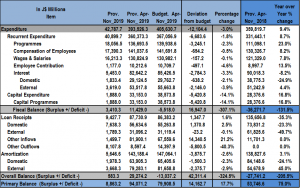Date: January 02, 2020
For the period of April to November 2019, the GOJ reported Total Revenues & Grants of $404.96 billion, $4.84 billion more than the Government’s projection. Furthermore, year over year, this represents an increase of approximately 25.2% relative to the $323.55 billion recorded for the corresponding period in 2018. ‘Tax Revenue’, ‘Non-Tax Revenue’ and ‘Capital Revenues’ outperformed projections during the review period. While, ‘Grants’ underperformed projections during the period. ‘Tax Revenue’ amounted to $361.11 billion, $5.05 billion more than budgeted while ‘Non-Tax Revenue’ of $39.65 billion was reported; $63 million more than budgeted. Whereas, ‘Capital Revenues’ totalled $826.3 million, $13 million or 1.6% more than budgeted. ‘Grants’ underperformed the budget by $301.9 million, amounting to $3.36 billion during the review period. Notably, no provisional amount was booked for ‘Bauxite Levy’ for the review period.

Expenditures
Total Expenditure for the period April to November 2019 amounted to $393.53 billion, $12.10 billion or 3.0% less than the budgeted $405.63 billion. Recurrent expenditure which totalled $360.37 billion, accounted for 91.58% of overall expenditures. Relative to projections, recurrent expenditure was $6.68 billion (1.8%) less than budgeted. Of the recurrent expenditure categories for the review period, all categories were below the budgeted amount. ‘Programmes’ which amounted to $136.69 billion, was $3.25 billion or 2.3% less than projected. Whereas, ‘Compensation of Employees’ which amounted to $141.04 billion was $654.2 million or 0.5% less than projected. In addition, ‘Employee Contribution’ totalled $10.21 billion, 4.6% less than the budgeted amount of $10.71 billion. Wages & Salaries’ amounted to $130.82 billion and was $157.2 million or 0.1% less than projected.
As a result of the decrease in Expenditures for the period April to November 2019, the ‘Fiscal Surplus’ was $11.43 billion, relative to a projected deficit of $5.52 billion. Additionally, the primary balance for the period amounted to $94.07 billion, 17.7% more than budgeted.

The country completed its 36-month Stand-By Arrangement with the IMF on November 10, 2019. The IMF noted that the country stuck to the reforms implemented, reduced public debt and is on track to meet “the legislated target of 60 percent of GDP by March 2026.” The country accessed approximately US$1.65 billion of SDR over the period.
In total, the country spent roughly 6 ½ years being supported by the IMF over two successive arrangements. Though growth has been low over this period, the IMF noted that other indicators such as “unemployment is at a historic low, credit recovery is gaining force on the back of substantial monetary easing, FX reserves are comfortable, and inflation is subdued.”
Disclaimer:
Analyst Certification -The views expressed in this research report accurately reflect the personal views of Mayberry Investments Limited Research Department about those issuer (s) or securities as at the date of this report. Each research analyst (s) also certify that no part of their compensation was, is, or will be, directly or indirectly, related to the specific recommendation (s) or view (s) expressed by that research analyst in this research report.
Company Disclosure -The information contained herein has been obtained from sources believed to be reliable, however its accuracy and completeness cannot be guaranteed. You are hereby notified that any disclosure, copying, distribution or taking any action in reliance on the contents of this information is strictly prohibited and may be unlawful. Mayberry may effect transactions or have positions in securities mentioned herein. In addition, employees of Mayberry may have positions and effect transactions in the securities mentioned herein.
